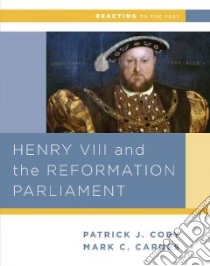Henry VIII and the Reformation of Parliament - 9780393937299
Un libro in lingua di Coby J. Patrick edito da W W Norton & Co Inc, 2013
- € 37.70
- Il prezzo è variabile in funzione del cambio della valuta d’origine
Cardinal Wolsey has just been dismissed as Lord Chancellor for failing to obtain an annulment of King Henry’s marriage to Catherine of Aragon. Thomas More is named as Wolsey’s replacement. More presides over Parliament, which the king hopes will somehow find the means to invalidate his marriage, thus freeing him to marry his new love, Lady Anne Boleyn. Apart from matters of the heart, matters of state also apply, for Henry has no male heir to carry on the Tudor line, and Queen Catherine has passed her child-bearing years.
But will Parliament be content with solving the king’s marital and dynastic problems? For there are some in Parliament who wish to use the royal divorce to disempower the English church, to sever its ties to papal Rome, and to change it doctrinally from Catholicism to Protestantism. Others are against the divorce, against supremacy and independence, and against this heretical creed filtering in from the Continent. More is their leader, for as long as he can survive. Thomas Cromwell leads the king’s party.
The king is ambivalent about the reformation unleashed by his “great matter,” as the divorce campaign is called, and so the conservatives are free to prosecute reformers as heretics, while the reformers are free to prosecute conservatives as traitors. Victory is up for grabs, because the king’s party is in fact a coalition of three dissimilar factions whose members are further divided by personal ambitions and jealousies. At issue is the clash of four contending ideas: medieval Catholicism, Lutheranism, Renaissance humanism, and Machiavellian statecraft.
Reacting to the Past is a series of historical role-playing games that explore important ideas by re-creating the contexts that shaped them. Students are assigned roles, informed by classic texts, set in particular moments of intellectual and social ferment.
An award-winning active-learning pedagogy, Reacting to the Past improves speaking, writing, and leadership skills, promotes engagement with classic texts and history, and builds learning communities. Reacting can be used across the curriculum, from the first-year general education class to “capstone” experiences. A Reacting game can also function as the discussion component of lecture classes, or it can be enlisted for intersession courses, honors programs, and other specialized curricular purposes.
Informazioni bibliografiche
- Titolo del Libro in lingua: Henry VIII and the Reformation of Parliament
- Lingua: English
- Autore: Coby J. Patrick
- Editore: W W Norton & Co Inc
- Collana: W W Norton & Co Inc (Paperback)
- Data di Pubblicazione: 13 Dicembre '13
- Genere: HISTORY
- Argomenti : Reformation England
- Pagine: 184
- EAN-13: 9780393937299


